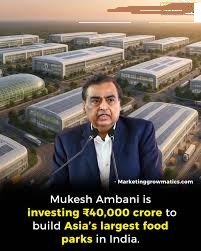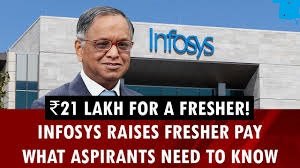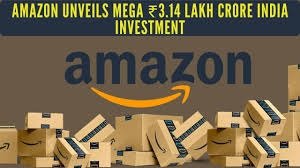Reliance Consumer Products Limited announces mega FMCG push with AI-driven factories, processing hubs, and global farm-to-fork supply chains
New Delhi (Economy India): Reliance Consumer Products Limited (RCPL), the FMCG arm of Reliance Industries, has unveiled a game-changing ₹40,000 crore plan to establish Asia’s largest integrated food parks in India. The ambitious move positions India as a potential global hub for food manufacturing, processing, and exports while creating billions of dollars in new FMCG opportunities.
The first food parks will be launched in Andhra Pradesh and Nagpur, with additional clusters planned across the country over the next three years.
Key Highlights of the Project
- 💡 ₹40,000 crore investment over three years
- ⚙️ Factories powered by AI, robotics, and automation
- 🥦 End-to-end farm-to-fork processing hubs
- 🌍 Focus on turning India into a global food export hub
- 👩🏭 Creation of thousands of direct and indirect jobs
- 📦 Boost to Reliance’s expanding FMCG portfolio, including staples, beverages, dairy, and packaged foods
Why Reliance is Betting Big on Food
Reliance’s push comes at a time when India’s processed food market is valued at over $500 billion, and FMCG remains one of the fastest-growing sectors. Mukesh Ambani has repeatedly emphasized that “consumer businesses will be the next growth engine for Reliance”, complementing the group’s dominance in telecom, retail, and energy.
The integrated food parks will serve as a backbone for Reliance’s FMCG strategy, competing head-on with established giants such as Nestlé, ITC, HUL, and Adani Wilmar.
The Big Announcement
On September 30, Reliance Consumer Products Limited (RCPL), the fast-moving consumer goods (FMCG) arm of Reliance Industries, announced one of the boldest ventures in India’s food sector history: a ₹40,000 crore investment plan to establish Asia’s largest integrated food parks.
The projects, which will start in Andhra Pradesh and Nagpur, are designed to use cutting-edge AI, robotics, and advanced processing systems. They will link farmers directly to processing hubs and bring India closer to becoming a global farm-to-fork manufacturing powerhouse.
Why Food? Why Now?
Reliance already dominates in telecom (Jio) and retail (Reliance Retail), and has a growing presence in energy. But Ambani has repeatedly emphasized that consumer businesses are the group’s next growth frontier.
India’s processed food market, valued at over $500 billion, remains fragmented and underpenetrated. Consumption is rising rapidly due to:
- Urban lifestyles demanding packaged and ready-to-eat food.
- A growing middle class with higher purchasing power.
- Government incentives for food processing and exports.
For Reliance, this sector is both strategic and scalable, with enormous room for growth.
A Vision Beyond India
Reliance’s food parks aren’t just aimed at domestic consumption. They are being designed to meet global export standards, enabling India to:
- Compete with Brazil, China, and the US in agricultural exports.
- Supply processed food to markets across Asia, the Middle East, Europe, and Africa.
- Strengthen India’s role in global food supply chains amid shifting geopolitics.
Experts estimate this move could unlock $10–15 billion in annual exports by 2030.

How the Food Parks Will Work
The integrated food parks will include:
- AI-powered factories for maximum efficiency.
- Cold-chain logistics hubs for perishable goods.
- Packaging and branding centers to build global-ready Indian food products.
- Training facilities to upskill farmers and local workers.
The farm-to-fork model ensures that farmers, suppliers, processors, and distributors are connected within one ecosystem, reducing waste and increasing value addition.
Impact on Farmers and Jobs
Reliance’s entry could reshape the livelihoods of millions of farmers by:
- Offering direct procurement contracts.
- Reducing dependence on middlemen.
- Providing access to better pricing and modern techniques.
Additionally, the project is expected to generate:
- 50,000+ direct jobs in factories and logistics.
- 2–3 lakh indirect jobs in farming, distribution, and allied services.
The Competitive Landscape
Reliance is not entering an empty field. The FMCG and food processing space already includes powerful rivals:
- ITC with Aashirvaad, Sunfeast, and Yippee.
- HUL (Unilever) with packaged foods and beverages.
- Nestlé India with Maggi, Nescafé, and dairy products.
- Adani Wilmar in edible oils and packaged foods.
However, Reliance has three unique advantages:
- Scale of capital (₹40,000 crore upfront).
- Distribution muscle via Reliance Retail.
- Data insights from Jio’s 450 million subscribers.
Historical Context – Reliance’s FMCG Journey
Reliance’s FMCG ambitions aren’t new. In 2022, RCPL entered the space with products like Independence brand staples and the acquisition of Campa Cola. It has since expanded into biscuits, confectionery, dairy, and personal care.
But the food parks signal a structural shift: moving from being a brand player to becoming an ecosystem builder for India’s food economy.
Government Policy and Alignment
The Indian government has been pushing for:
- PLI (Production-Linked Incentives) for food processing.
- Boosting food exports under Make in India.
- Attracting FDI in agriculture-linked sectors.
Reliance’s mega-investment directly supports these goals, giving policymakers a major win in showcasing India’s industrial potential.
Risks and Challenges
Despite the promise, challenges loom large:
- Global trade tensions (e.g., US tariffs on Indian goods).
- Infrastructure gaps in rural logistics.
- Competition from MNCs with decades of brand trust.
- Farmer resistance if procurement is not perceived as fair.
Managing these risks will be critical to success.
Expert Commentary
Economist Dr. Ritu Anand told Economy India:
“Reliance’s food parks could be the single most transformative step in India’s FMCG history. If executed well, this initiative will not just create jobs but reposition India as a global food leader.”
Industry consultant Praveen Singhal added:
“The ₹40,000 crore bet shows Ambani’s long-term confidence in Indian consumption. Unlike telecom or retail, food is recession-resistant, which makes this move strategically smart.”
The Road Ahead
The next three years will be decisive. If Reliance successfully executes its vision, India could witness:
- The largest-ever shift in food processing capacity.
- India’s rise as a major food export hub.
- Reliance emerging as a global FMCG giant.
Mukesh Ambani’s bet is clear: food is the future, and Reliance wants to own it.
Global-Scale Vision
Reliance’s plan isn’t limited to domestic consumption. By building food parks aligned with global export standards, the company aims to:
- Tap into rising demand for Indian food products overseas.
- Strengthen India’s role in global agri-supply chains.
- Support the government’s vision of making India a manufacturing powerhouse.
Industry experts estimate that this move could unlock $10–15 billion in food exports annually by the end of the decade.
What’s Next
The first phase of the project will roll out by FY 2026, with Andhra Pradesh and Nagpur serving as anchor locations. Reliance is also expected to work closely with state governments, farmers, and SMEs to integrate local supply chains into the ecosystem.
With this bold bet, Mukesh Ambani is not just entering the food sector—he is attempting to redefine it at a scale India has never seen before.
(Economy India)















